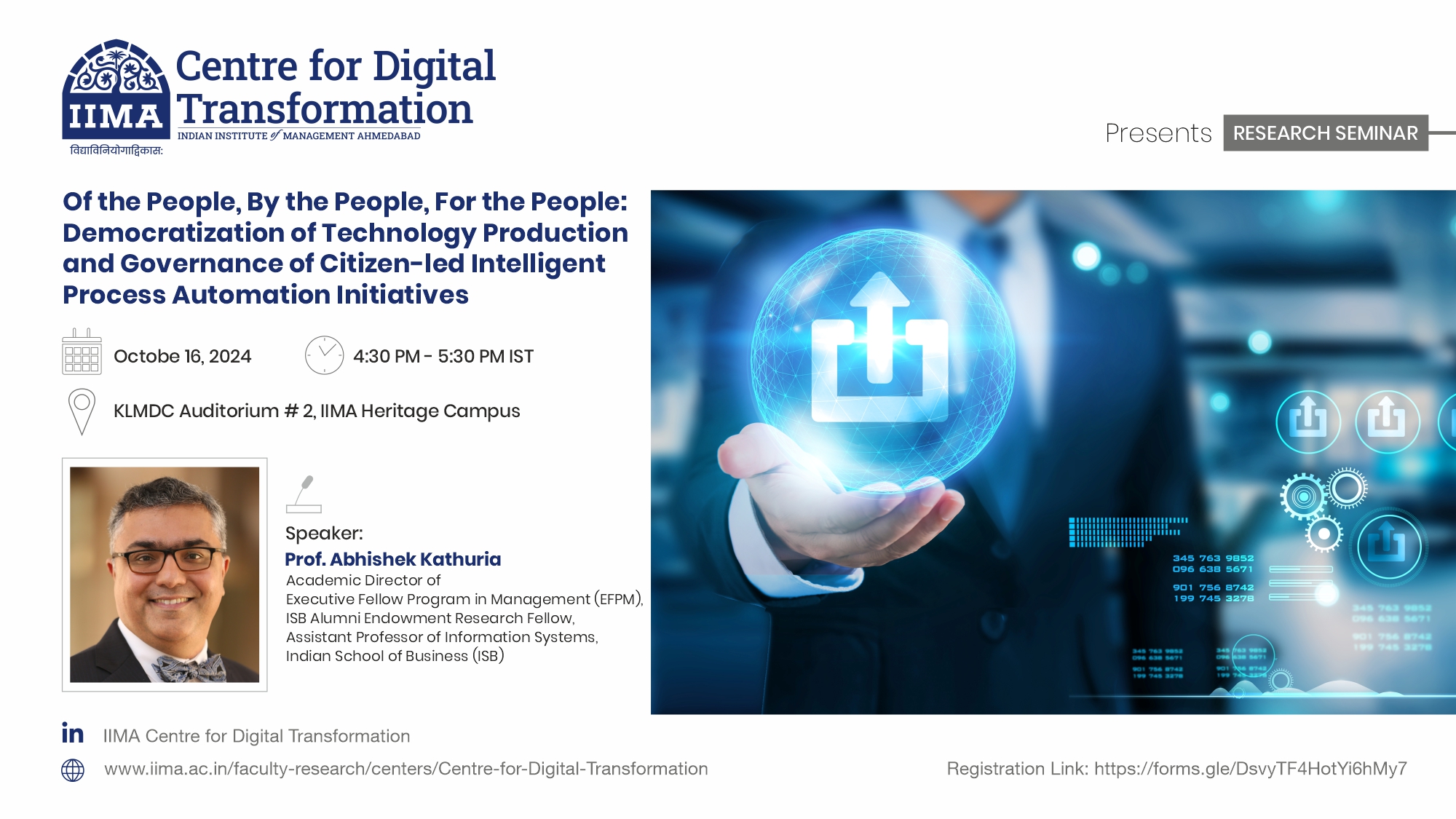
16/10/2024

Abstract : Intelligent Process Automation (IPA), a form of intelligent systems, is an amalgamation of robotic process automation, artificial intelligence (AI) algorithms, and process mining. While IPA is transforming organizations by leveraging AI in the automation of processes, there are increasing questions pertaining to the payoffs and performance of intelligent systems. Prior research has established that governance is critical to the performance of technology initiatives. The ability of IPA to act and learn autonomously and be conceived and implemented by end users or citizens through low-code, no-code systems differentiates it from technologies historically used in organizations. This requires a fundamental re- examination of the role of governance in the success of IPA initiatives. Thus, we collaborate with a Fortune 200 US multinational to study how IPA initiatives can be effectively governed. We curate and investigate data from 176 IPA initiatives in the Banking, Financial Services, and Insurance industry. Using a novel research design integrating abduction-induction-abduction, we offer a theoretical framework to study the confluence of characteristics of IPA initiatives along the Governance, Process, and Technology dimensions. We uncover that Citizen Request Genesis, Citizen-led Implementors, and Low Code Extensiveness, exemplifying democratization of technology production, are individually and conjunctively vital characteristics for explaining performance outcomes of IPA initiatives. Ergo, the initiation and implementation of low-code, no-code IPA initiatives by citizens are, independently and in combination, essential to the Utilization and Repeatability of IPA initiatives. To tie these key outcomes to organizational performance metrics, we follow a guided abduction process to uncover the conjunctive influence of Utilization and Repeatability on Payback and FTE Reduction. Doing so allows us to showcase a citizen-centric story characterizing the democratization of IPA initiatives. We contribute to the literature on intelligent systems through a broad, process-level examination of IPA initiatives across pre-implementation, implementation, and post-implementation phases that uncovers individual and conjunctive conditions of IPA success. We contribute to the literature on the governance of information systems development projects by revealing that decentralizing governance of IPA initiatives to individual business users is vital for success, and small and simple IPA initiatives have complex and nuanced governance conditions and new governance activities that differ from those known for larger monolithic projects.
Short Bio : Abhishek Kathuria is an Assistant Professor of Information Systems and ISB Alumni Endowment Research Fellow at the Indian School of Business, where he also serves as the Academic Director for the Executive Fellow Program in Management. His research, teaching, and consulting interests lie at the intersection of technology and strategy. Dr. Kathuria’s research examines the antecedents and business value of firm-level IT, focusing on innovation, globalization, and emerging economies. His work has been accepted in such journals as Information Systems Research, Journal of the Association for Information Systems, Journal of Management Information Systems, MIS Quarterly, and Production and Operations Management, among others, and received multiple best paper nominations and awards at various academic conferences.
Dr. Kathuria has co-founded & advised multiple startups in India and Hong Kong and is an active angel investor, with interests in several emergent market leaders. He is also a Director with Actuate Business Consulting – India’s oldest boutique management consulting firm - and has consulted on business and digital transformation and organizational turnarounds with public and private corporations in GREAT (growing, rural, eastern, aspirational, transitional) domains such as India, China, and the Middle East.
Prior to joining the ISB, Dr. Kathuria served on the faculty at The University of Hong Kong. He holds a Ph.D. from the Goizueta Business School at Emory University, a graduate degree in management from the Indian Institute of Management Indore, and an undergraduate degree in information technology.
